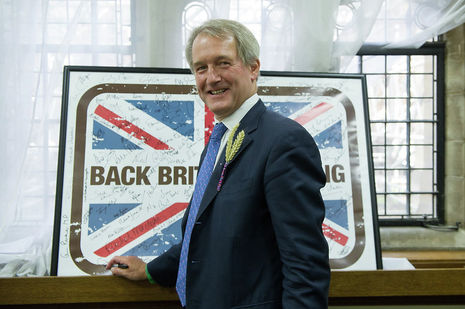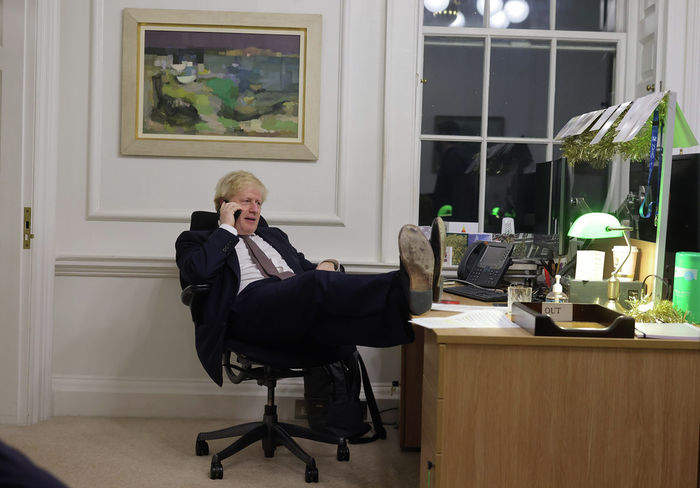Owen Paterson’s Banana Republic
Laurie Wilcockson argues that the suspension and turbulent resignation of Owen Paterson highlights the disregard for parliamentary codes within Westminster, of which the Prime Minister is at the centre

In many ways, it’s the classic tragic love story. An elected representative meets two private companies, they fall in love, he tries to help them procure political inlets, the companies pay him hundreds of thousands a year, then they get caught out, he gets thrown under the bus by the Prime Minister, and it all falls apart. A tale as old as time.
Owen Paterson, a lobbyist who represents North Shropshire at the House of Commons in his spare time, has resigned as MP, and rightly so. His tragic love story with two private companies was inexcusable from a moral standpoint, even if completely evadable from a political one. However, the ensuing political catastrophe in Johnson’s now-aborted intervention to try and save his friend meant that keeping his seat was not only against his own interest but that of the entire Conservative Party. The question of whether or not he quit of his own accord is trivial: the fact of the matter is that he only had to quit because of the hatchet-job the PM made of an attempted rescue mission.
“The question of whether or not he quit of his own accord is trivial: the fact of the matter is that he only had to quit because of the hatchet-job the PM made of an attempted rescue mission”
When Paterson was accused of breaking parliamentary code, it was for his dealings with two companies: Randox and Lynn’s Country Foods. The former may ring a bell if, like me, you went abroad at any point during the summer: Randox has a near-monopoly on compulsory ‘Day-2’ PCR tests, costing £43 apiece. On top of this extortionate pricing, they won nearly half a billion pounds in uncontested government contracts to provide these tests, despite the small fact that they did not have enough equipment to do so. Coincidentally, before this contract was signed a phone call was shared between Lord Bethell (the minister in charge of sourcing coronavirus testing), Randox Laboratories, and who else but Owen Paterson.
None of this had been brought into the public eye until it was highlighted by a recent Times article. Indeed, the formal reasons given for Paterson’s suspension were for several instances when he broke parliamentary code by approaching the Food Standards Agency, and the Department for International Development (now part of the Foreign Office) on behalf of Randox and Lynn’s Country Foods. The importance of this revelation cannot be underestimated since it changes the tone and focus of the debate in Patterson’s suspension entirely.
The defence of Paterson was put very clearly and concisely by Miriam Cates (the Conservative MP for Penistone and Stocksbridge). “At the end of the day, this is a conscience vote and in all conscience, I can’t accept that this is a fair process that would stand up in court.” Here’s the issue: regarding the initial reasons for Paterson’s suspension in his approaches to the FSA and DfID, she is entirely correct. In order to stand up in court, the burden of proof means that to successfully claim that Paterson’s actions were corrupt, one would need to provide evidence that both companies profited from his actions. Since he clearly wasn’t a very good lobbyist — they did not.
“with a view to transforming the Government from a ministerial to an almost presidential state”
However, if we bring the revelations from the Times article that Paterson was acting as a paid lobbyist in his call with Lord Bethell into the equation then not only did Randox profit, but they profited to the tune of hundreds of millions of pounds from his actions. Suddenly Cates’ case looks a little less strong.
And so, when 246 Conservative MPs voted in favour of the Andrea Leadsom amendment that would have seen Paterson’s suspension put on hold, suddenly it appears as though each and every one of them is complicit in the corruption. Here, there are some big names who deserve a shout out for their vote: Graham Brady, chair of the 1922 committee which is designed to hold the Tory leadership to account; Jeremy Hunt, chair of the Health and Social Care Select Committee; Desmond Swayne who recently accused the Government of acting inappropriately by leaking details of the budget to the press; and of course, Owen Paterson himself.
The fact that this was allowed to go through the House of Commons is a disgrace to our democracy, and it is not the first time that Johnson has moved to overrule independent standards authorities. Increasingly, it appears impossible to argue against the fact that the UK has a Prime Minister without regard for the limitations of his power, with a view to transforming the Government from a ministerial to an almost presidential state.
Of course, there are arguments for why this could be a beneficial move — the way the government is supposed to operate via rule by committee can lead to factionalism, internal divides, and mean little actually gets done. For example, just look at Theresa May’s government and the frankly unbelievable number of resignations she had to deal with, and how little was achieved.
However, even if you argue that we are to have singular rule under a Prime Minister, then at least let it not be an inherently corrupt one. After all, the Paterson affair is not the only scandal to have emerged in recent weeks. To name only a few: MP Geoffrey Cox who was asked to advise the British Virgin Islands government in a lawsuit against the British government; or Chris Grayling who is being paid £100,000 a year to advise a shipping company; or even Ben Bradley who claims to work 60 hours a week on top of his work as an MP.
To all of these MPs I suggest the following; if you are working in a direct conflict of interest for a job you are barely qualified for, or for so long that you cannot have time for your work as an MP – maybe then you shouldn’t be one. Being an MP is one of the most important and influential jobs in Britain, and people like Paterson, Cox, and even the Prime Minister himself bring shame on it by exploiting it for their own, private means.
 News / Downing investigates ‘mysterious’ underground burial vault 29 December 2025
News / Downing investigates ‘mysterious’ underground burial vault 29 December 2025 News / Unions protest handling of redundancies at Epidemiology Unit30 December 2025
News / Unions protest handling of redundancies at Epidemiology Unit30 December 2025 Lifestyle / Ask Auntie Alice29 December 2025
Lifestyle / Ask Auntie Alice29 December 2025 Features / ‘Treated like we’re incompetent’: ents officers on college micromanagement30 December 2025
Features / ‘Treated like we’re incompetent’: ents officers on college micromanagement30 December 2025 Science / Astronomical events to look out for over the break29 December 2025
Science / Astronomical events to look out for over the break29 December 2025










